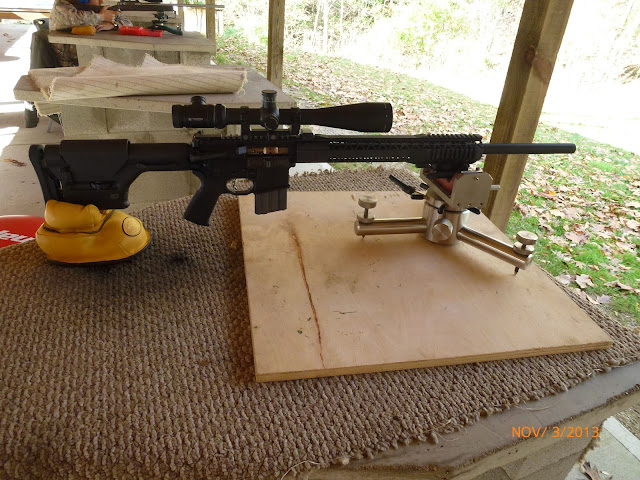MY GUN IS NOT YOUR RIFLE. It was safe in mine. It may not be in yours. Always use caution when developing loads for your rifle.
I have been maintaining magazine length ammunition
in evaluating several bullets and powder combinations with the Black Rain
Ordnance PG4. However, I wanted to see if allowing the bullet to be closer to the lands would affect the group size. At the very bottom of the entry is a description of the sinclair tool and how I used it.
I chose to use 77 grain Sierra Match King bullets
with Vihtavouri N540 powder from magazine length (2.260) to within 10 thousands of the
rifling (and thus require loading them one at a time). A magneto speed
chronograph was used to obtain preliminary velocity data over the expected
loading range. 24.5 grains was selected as a starting point for load
development for this experiment with an expected velocity of approximately 2800 fps. This powder and charge had been previously tested and found to be sub moa at 100 yards at magazine length (in addition to being safe with no pressure signs). This
rifle is hoped to be competitive at 300 to 600 yards, and so heavy for caliber
bullets with high ballistic coefficients that could still be fired with good
velocity out of the 1 in 8 twist barrel was preferred.
Rifle: Black Rain Ordnance PG4, 5.56/223,
AR15 style rifle with a 24 inch bull barrel.
Brass: Lake City (new from the same lot)
Brass prep: Mouth of brass was chamfered with
Lyman VLD chamfer, deburred with Wilson debur tool. Brass was sprayed
with Hornady One Shot (including into the neck), and then full length resized
using stander Redding dies and a carbide ball expander.
Primer: CCI 41 primed using a RCBS priming
tool
Powder: N540 at 24.5 grains using a Harrel's
Premium Powder measure and Hornady scale
Bullet: Sierra Match King 77 grain seated to
depth with standard redding dies
Previously, a test of powder (Viht N540) vs velocity was conducted over the recommended range of powder weight using a magneto chronograph.
The seating depth experiment was setup using a
sinclair measurement tool for an AR15.
The final experiment consisted of bullets at 0.010,
0.050, 0.090, and 0.11 jump corresponding to OAL (overall length) of 2.3585,
2.3185, 2.2800, and 2.2600 as measured. 2.260 was used since that is
usually the length associated with the maximum magazine length.
Each length has 15 bullets prepared, for three 5 shot groups. Shooting
was done on a rest, rear bag, using a Sinclair benchrest adapter for a
picatinny rail. The results show that longer than magazine length did improve the group size from an average of 0.920 to 0.776 inches at 100 yards. The rifle at 300 yards using 2.260 inch OAL bullets had grouped 2.1 inches at 300 yards during a visit to a Washington State range (off bipod, prone), and the 10 shot group is shown below.
|
|
Three 5 shot groups at each seating depth at 100 yards
|
24.5 grains N540, Lake city brass, cci 41 primers, 77 grain SMK
|
|
|
|
|
|
|
|
|
|
|
|
|
|
|
|
|
|
|
|
|
|
|
|
|
|
|
|
|
|
|
Other bullets and the measurements with the Sinclair measurement tool included the following for later load development.
|
|
|
|
|
|
Black Rain 223 Seat Depth
Measurements
|
|
Bullet
|
|
|
77 Grain Sierra Match
King
|
70 Grain Berger VLD
|
Hornady 55 grain VMAX
|
Nosler 69 grain HPBT
|
Measurement
|
1.899
|
1.917
|
2.0065
|
1.9785
|
Comparitor
|
|
0.5
|
0.5
|
0.5
|
0.5
|
Bullet
|
|
0.9705
|
0.9575
|
0.8165
|
0.8905
|
OAL to
touch lands
|
2.3695
|
2.3745
|
2.323
|
2.369
|
|
|
|
|
|
|
|
|
|
|
|
|
Black Rain Rifle

Five shot groups at 100 yards
10 shot group at 300 yards, prone, using a bipod (in Washington State)
Steps to using the Sinclair Tool in the AR15 (measurements are not of the black rain rifle)


















